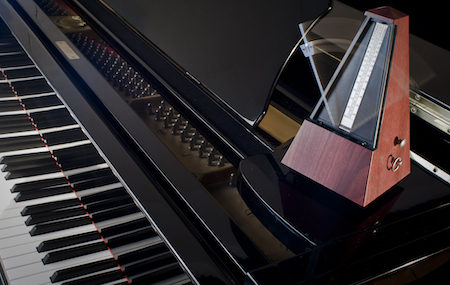As a piano student, what are the most important tools in your quest for learning?
A piano is mandatory – you can’t play the piano without a high quality piano.
A piano bench – sitting at the keyboard properly ensures you’ll become a better player over time.
Piano music – it’s important to learn how to read music and how to play it well.
Those three tools are mandatory. Every piano student understands that and has these tools in place before sitting down to play for the very first time.
But there’s another tool that is vital to improve your musical abilities. It helps you with your rhythm, and teaches you how fast or slow to play each song.
A metronome forces you to pay attention to time. It’s a device that helps keep rhythm and timing while playing a song. It has a specific sound, typically a clicking, that allows you to feel the beat and adjust your playing to create higher quality music.
The most common is an old-fashioned metronome that winds up and has a pendulum rod that swings back and forth. It provides both visual and audio cues to help you while you’re learning. Of course, with modern-day technology, there are a variety of apps available too, which can be good to bring along and help you practice wherever you have the opportunity.
Why should you use it for practice?
It teaches the piano student to understand time signatures. Every piece of music is created with a time signature, the speed at which the composer intended the music to be played at. It’s difficult to play a new piece without using this as your starting point. A metronome can give you the cues you need to learn it at the appropriate levels.
It teaches the piano student to develop consistency. It’s easy to speed up and slow down as you’re learning new music. A metronome holds the rhythm steady as you continue moving through each portion of the music.
It teaches the piano student to develop a sense of timing. You often hear someone say that top musicians have a sense of music. What they really mean is they have a sense of timing. This comes from understanding how a song should be played, and picking up on the visual cues of how to make the song enjoyable. This comes with practice, patience, and passion.
How long have you been a piano student? Do you have a metronome available for your practice sessions? If not, maybe now is the time.


